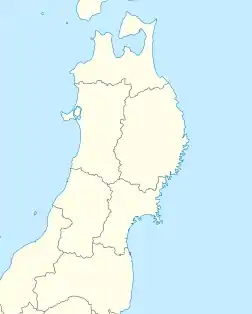| 山形県沖地震 | |
 | |
| UTC time | 2019-06-18 13:22:20 |
|---|---|
| ISC event | 615958611 |
| USGS-ANSS | ComCat |
| Local date | June 18, 2019 |
| Local time | 10:22 p.m. JST |
| Magnitude | 6.4 Mw
(USGS) 6.7 MJMA (JMA) |
| Depth | 10 km (6 mi) |
| Epicenter | 38°38′06″N 139°27′14″E / 38.635°N 139.454°E |
| Type | Reverse |
| Areas affected | Ishikawa Prefecture, Miyagi Prefecture, Niigata Prefecture, Yamagata Prefecture, and southern Akita Prefecture[1] |
| Max. intensity | VII (Very strong) JMA 6+ |
| Tsunami | Yes (up to 10 cm (4 in))[2][3] |
| Casualties | 26 injured |
The 2019 Yamagata earthquake (山形県沖地震, Yamagata-ken Oki Jishin)[1] was an earthquake of magnitude 6.4 Mw which struck primarily the Hokuriku region in Japan on 18 June 2019 at 22:22 JST (13:22 UTC). The epicenter was close to the city of Tsuruoka, Yamagata.[4][5][2][3] A tsunami warning was also issued.[2][3]
Geology
The northwestern side of Honshu lies on the southeastern margin of the Sea of Japan, an area of oceanic crust created by back-arc spreading from the late Oligocene to middle Miocene. The extensional tectonics associated with the spreading formed a series of N-S trending extensional faults and associated basins. The crust in this area is subjected to east–west compression associated with the convergent boundary between the Amur Plate and the Okhotsk Plate[upper-alpha 1]. As a result of this strain, the north–south trending extensional faults are reactivated in a reverse sense.[6] The 1964 Niigata earthquake, the 1983 Sea of Japan earthquake, and the 1993 Hokkaidō earthquake were all a result of similar processes.[7]
Damage and effects
The magnitude 6.4 earthquake triggered a tsunami advisory for three prefectures in Japan.[8][5] A tsunami with a height of 10 cm was reported in Niigata.[9] The earthquake damaged a total of 149 homes in Akita, Niigata, and Yamagata prefectures.[10]
Casualties
Twenty-six people were reported to be injured, mostly by fallen debris.[11]
Transportation
Sections of the Nihonkai-Tōhoku Expressway and Yamagata Expressway were closed by the East Nippon Expressway Company. National Route 345 was blocked by fallen debris in Murakami.[12]
Utilities
Tohoku Electric Power announced that a blackout occurred in parts of Yamagata and Niigata prefectures because of the earthquake, with 1000 customers impacted in Tsuruoka and 200 customers impacted in Sakata.[13] As a safety precaution, gas services were interrupted in Niigata Prefecture.[14]
Seismic intensity
.jpg.webp)
This chart describes the maximum perceived shaking using the Japan Meteorological Agency seismic intensity scale, or Shindo scale, for the earthquake throughout the impacted area.
| Intensity | Prefecture | City or municipality name |
|---|---|---|
| 6+ | Niigata | Murakami |
| 6- | Yamagata | Atsumigawa, Tsuruoka |
| 5+ | Atsumi, Tsuruoka, Michidamachi, Tsuruoka | |
| 5- | Niigata | Nagaoka, Kashiwazaki, Aga |
| Yamagata | Other areas in Tsuruoka, Sakata, Ōkura, Mikawa | |
| Akita | Yurihonjō |
See also
References
Explanatory notes
- ↑ These minor plates are arguably part of the Eurasian Plate and North American Plate, respectively.
Citations
- 1 2 "山形県沖を震源とする地震による被害及び消防機関等の対応状況(第8報)" (PDF) (in Japanese). 19 June 2019. Retrieved 20 June 2019.
- 1 2 3 "Japan earthquake: Strong quake strikes off northwestern Japan, triggers tsunami warning". KGO-TV San Francisco. Associated Press. June 18, 2019. Archived from the original on June 21, 2019. Retrieved June 21, 2019.
- 1 2 3 Byrne, Kevin; Leister, Eric (June 19, 2019). "Magnitude 6.4 earthquake strikes near Japan's west coast, causes injuries and damage". AccuWeather, Inc. AccuWeather. Archived from the original on June 21, 2019. Retrieved June 21, 2019.
- ↑ "M 6.4 - 33km WSW of Tsuruoka, Japan". earthquake.usgs.gov. Retrieved 2019-06-18.
- 1 2 "新潟県で震度6強 山形県で震度6弱" [Niigata Prefecture has a seismic intensity of 6 high. Yamagata Prefecture has a seismic intensity of 6 low]. NHK.or.jp (in Japanese). 2019-06-18. Retrieved 2019-06-18.
- ↑ "震源は「日本海東縁ひずみ集中帯」 逆断層型、繰り返し発生 新潟震度6強" (in Japanese). Mainichi Shimbun. 18 June 2019. Retrieved 20 June 2019.
- ↑ Sato, H.; Yoshida T.; Takaya I.; Sato T.; Ikeda Y. & Umino N. (2004). "Late Cenozoic tectonic development of the back arc region of central northern Honshu, Japan, revealed by recent deep seismic profiling". Journal of the Japanese Association for Petroleum Technology. 69 (2): 145–154. doi:10.3720/japt.69.145. ISSN 0370-9868.
- ↑ "Earthquake rocks Japan; tsunami advisory issued". USA Today. 2019-06-18. Retrieved 2019-06-18.
- ↑ "Tsunami Information (tsunami observations)". Retrieved 19 June 2019.
- ↑ "山形県沖を震源とする地震による被害及び消防機関等の対応状況(第11報)" (PDF) (in Japanese). 24 June 2019. Retrieved 29 June 2019.
- ↑ "At least 26 injured in earthquake in Japan's northwest". The Japan Times Online. 2019-06-19. ISSN 0447-5763. Retrieved 2019-06-19.
- ↑ "山形と新潟、地震で高速道路に規制 日本海東北道、山形道で一部通行止め" (in Japanese). Fukui Shimbun. 19 June 2019. Archived from the original on 15 September 2019. Retrieved 19 June 2019.
- ↑ "新潟や山形で1000戸以上停電 新潟震度6強" (in Japanese). Mainichi Shimbun. 19 June 2019. Retrieved 19 June 2019.
- ↑ "「ガス止まった」と報告相次ぐ 北陸ガス 新潟震度6強" (in Japanese). The Sankei News. 19 June 2019. Retrieved 19 June 2019.
- ↑ "地震情報(各地の震度に関する情報)" (in Japanese). JMA. 18 June 2019. Archived from the original on 19 June 2019. Retrieved 2019-06-19.
External links
- The International Seismological Centre has a bibliography and/or authoritative data for this event.